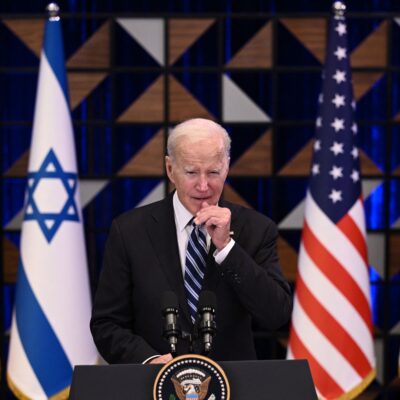McCaul warns administration on congressional review of Iran agreements
‘I urge the Administration to remember that U.S. law requires that any agreement, arrangement or understanding with Iran needs to be submitted to Congress’

Chip Somodevilla/Getty Images
House Foreign Affairs Committee ranking member Rep. Mike McCaul (R-TX) questions U.S. Secretary of State Antony Blinken during a hearing the about the State Department's FY2023 budget request on April 28, 2022 in Washington, DC.
House Foreign Affairs Committee Chairman Michael McCaul (R-TX) warned the administration against attempting to evade congressional oversight of any potential agreement or understanding that might emerge from the renewed talks with the Iranian regime that have been confirmed in recent days.
McCaul, in a letter to President Joe Biden on Thursday, said that he was “disturbed” by the revelation of renewed talks and the “apparent greenlighting of sizable payments to Iran,” which he said “calls into question your Administration’s intent to follow the law and submit any agreement with Iran to Congress.”
The letter echoes concerns from critics of the administration’s Iran policy that the administration may seek to avoid congressional review of arrangements finalized through the latest rounds of talks.
McCaul argued that the Iran Nuclear Agreement Review Act of 2015 (INARA) is “deliberately expansive in scope” and that “any arrangement or understanding with Iran, even informal, requires submission to Congress.”
“Any continued obstruction will rob the American people, and in particular the Gold Star families whose loved ones were killed by Iran-backed terrorism, of answers about why the United States is facilitating the lining of Iran’s coffers,” he wrote.
The top HFAC Republican also alleged that the State Department has ignored a request for Special Envoy for Iran Rob Malley to testify before HFAC since early April, accusing the administration of a “lack of transparency” that is “deeply disturbing”
McCaul argued that a deal to cap Iranian enrichment at 60% — allegedly one component of the emerging understanding — would undermine global nonproliferation norms.
“Rather than using United States diplomatic leverage and military deterrence to dissuade Iran from engaging in these malign activities, this Administration is rewarding Iran’s bad behavior in exchange for a false promise of de-escalation,” McCaul wrote.









